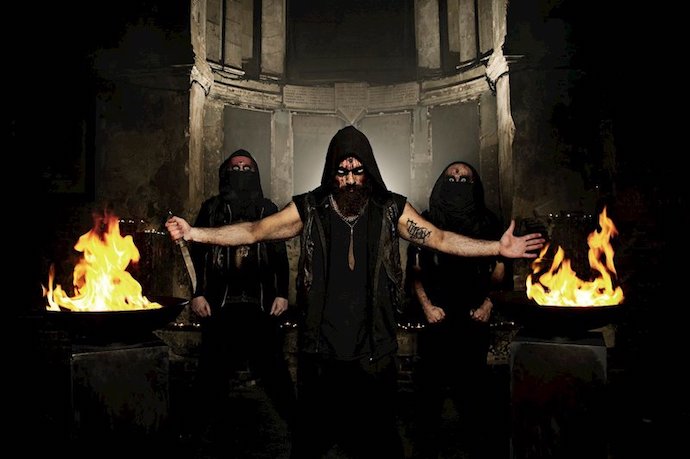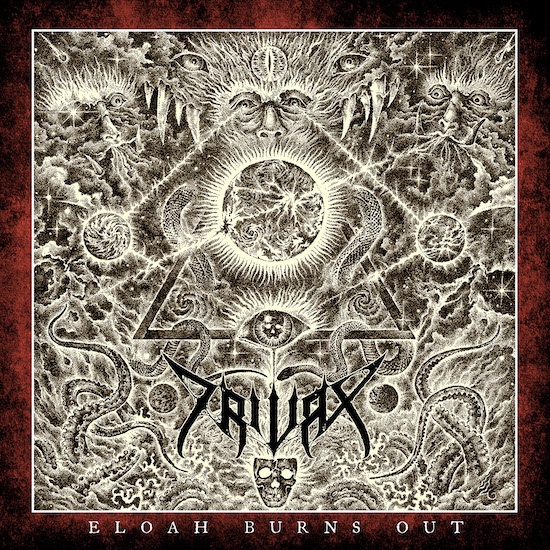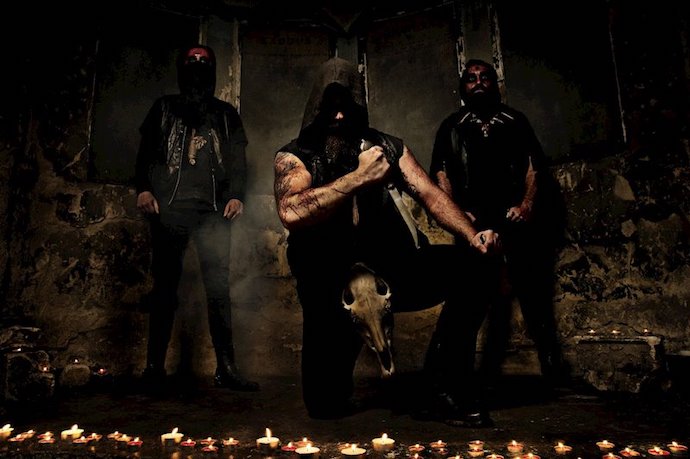
photo by Ester Segarra
(Last week we reviewed the new album by Iran-born, UK-based Trivax (recently released by Cult Never Dies), and today we follow that with a wide-ranging interview by Comrade Aleks of the band’s founder Shayan S.)
Trivax was started in April 2009 in Iran by Shayan S. (guitars, vocals) who moved to Birmingham in 2011 and reformed the band with a new lineup there. The first one who joined Shayan back then was the drummer Matthew Croton, as the current bass-player Sully get involved in Trivax in 2018.
While the first album SIN (2016) didn’t have a big impact, it seems that the new full-length blackened death metal manifest Eloah Burns Out will have it. Trivax came fully armed. Their new video “Azrael” is striking and kind of shocking; their performance at the Cosmic Void festival in London got its praise too; and Eloah Burns Out itself, released by Cult Never Dies on September 29th, promises to be one of most authentic extreme albums of 2023.
Let’s take a look at the modern world’s lunacy and satanic magic through the Trivax prism together with Shayan.
******
Hi Shayan! How are you?
I’m good, thank you – it’s good to finally get this album out there!
Trivax’ second album Eloah Burns Out is just released. How busy are you with promotion and other activities? I see that you performed the album at the Cosmic Void festival in London. Do you have dates for others gigs?
I would say that, so far, the entirety of 2023 has been the busiest year of TRIVAX for me personally, which says a hell of a lot, but there are no complaints from me whatsoever!
We are currently in the process of some big plans for 2024, but there’s not much I can reveal just yet, other than saying that we’ll be exploring new territories and will definitely be doing our best to bring this new album to as many hearts and ears as possible.

What are your impressions from the show? Are you satisfied with the organization and people’s reactions?
Cosmic Void was a terrific experience. Other than the fact that I was personally involved with the crew on the latter two days which we weren’t playing, I found that the organization was spot on and the line-up was fantastic, which is something that speaks for itself.
The reception we had at this show was truly phenomenal, arguably our biggest and most important show yet in the capital city of London. It was also a pleasure to share the stage with our comrades in Mare and Misþyrming, who we have had a mutual bond with, as well as getting to meet the fine gentlemen in Mephorash and getting to watch all of their performances.
I just read one of your interviews from 2016, so I have a few retrospective questions. You said that Trivax isn’t completely a black metal band because of all the side influences, etc., and I see your point. What’s your attitude towards it? Is it an anti-social position? Are you into the occult side of things? Or is it that “do what thou wilt” story?
I don’t exactly recall which interview, but I would say that’s probably still true. I suppose our approach is a combination of all of the things that you mentioned, and even more.
If you look at the standard blueprint of what Black Metal is and is supposed to look like, TRIVAX probably doesn’t have an extreme amount of common grounds with it on a surface level, but as far as the intent is concerned, I would say that we are absolutely a Black Metal band.
I will also add the following, that we don’t feel the necessity to fit into any particular genre, as our story, background and intent is something that is very unique within music history itself – but it does seem that the volatile nature of our organic expression is most compatible with Black Metal.
Almost the same way that Judas Priest in the ’70s were Heavy Metal by “accident”, so to say.

photo by Ester Segarra
We used to see black metal mostly as an anti-Christian genre, but you lived in a Muslim country, so the situation there is harsher for sure. How did you get in touch with extreme metal culture? And how did you make a decision to dedicate your time and energy to this kind of music?
First off, I agree with your initial statement. For me, the discovery of this music was completely accidental, but perhaps not coincidental either, when I look back at the events in my life.
I have always thought that it was this music that found me, not the other way around. It didn’t even feel like a decision, as the characteristics and the traits of the Heavy Metal culture, particularly its rebellious nature, fit my personality like a glove, especially as a teenager.
You also stated that there’s no black metal without Satanism for you, correct me I’m wrong. It’s easy to understand bands who stand against monotheistic religions, but I wonder what makes them accept the rules of the game and use Christian images against it. You know, it’s like “Satan is the best of God’s inventions” in the commercial sense of the world. So I wonder why people avoid choosing atheism (which doesn’t grant shocking and provocative imagery) as an instrument of their struggle?
I think that perhaps a better way I would word this now, is to say that Black Metal is musical shadow work at its purest – of course, the spirit of the oppressor has always been present in the most crucial moments of this cultural movement. That is undeniable, for sure.
I would say that there is a standard benchmark within Black Metal, or Metal as a whole, which craves this degree of explosive angst which gives it that emotionally charged value, but as far as the interpretation of religion, reality and even Satan – I’ve discovered that it’s different for each individual and it’s something they can only relate to from their own experiences.
There are different dimensions to the whole thing. Many use atheism within Metal as a form of rebellion, because to them it’s a justification to acting the opposite of what monotheistic religions preach. In summary, I’d say that their stance is one of “Don’t tell me what to do” and there’s also an anti-colonialism aspect to it which is relevant to the spread of monotheistic religions.
On the other hand, you have those who genuinely follow the esoteric occult traditions, and the nature of their rebellion is mostly stemmed from an actual theistic approach to the matter, which I would argue is far more effective, and it’s also more of a “fight fire with fire” type of ordeal.
Now, as far as my personal beliefs are concerned, I can absolutely assure you that I am not an atheist. At least, not anymore. I tried to be for a long time, but I have simply seen and experienced too much to purposely close my eyes to the world. But I understand both sides of the spectrum.
You presented Eloah Burns Out with the video “Azrael”. Visually, it’s a concentrated mix of war shit happening today with Trivax’ aggressive authentic delivery. It’s shocking, it’s provoking, and yet it happens all the time: the constant conflicts in the Middle East, the constant civil wars with hundreds of thousands of deaths in Africa (the last thing Civil people care about), and now the problem taking another scale with the war in Ukraine. Do you see a real difference regarding this, as your homeland was in the middle of political and cultural struggles quite a long time during the recent history?
It’s interesting that you would ask that question, as I have been more and more drawn into educating myself over geopolitics in general as of late. Iran has always been a political hotspot in the grand scheme of things, particularly since the 1979 revolution where it has been known as the boogeyman to the rest of the world. There are fair reasons for this also.
There’s a lot we could talk about in regards to the history of Iran and why it has been the way that it is, but also, to your point, I think that a lot of what happens in the world is a result of two things: 1- the human condition as a whole, our emotions and desires and the actions which they inevitably lead us towards. 2 – The simple fact that, despite being a gamble, war equals profit for certain parties, therefore there are always those powers that will push for these unfortunate events (aka the military industrial complex) and this applies to all of the examples which you just mentioned.
Today’s news brought word of the invasion of Israel by Hamas, and besides all the bestial horrors we see happening here and there, there’s another, eschatological, aspect, as one of this conflict’s causes (among many) lies in the constant conflicts around the Al-Aqsa Mosque which is considered a place where the Antichrist should be crowned. The one who believes in Satan automatically should believe some stories from the Bible. What’s your attitude towards the controversial theme of the final battle, the end of days, and so on?
I think that, the more time passes by, the more I can see that the veil of the world is getting pulled down – We are definitely entering the age of Kali Yuga.
How did you work over the ‘Azrael’ video plot? The result reflects Trivax’ essence quite precisely, so how much time did all the preparations take?
A very long time… The concept alone, was something that I already had in mind during the recording sessions in 2019, particularly the flagellation scene with the chains and how it would go over the music, etc. As you might notice, even on the song itself, you will hear the sound effects of those chains and the mix that you hear is from 2019 also!
I would say that, including the conceptual meetings, preparations, shooting and the postproduction – the video took roughly 18 months to make. This was obviously including the various other things which we were focusing on in between that time.
How important is the visual side of Trivax for you? The artwork of Eloah Burns Out is very impressive, as well as the mentioned above video. Is it important to you if people dig these undercurrents of your art? Or does it work for you as long as people bang their heads during the gigs?
Thank you – The beautiful thing about art is that, it’s always up for interpretation, and each person will always see/hear it through their own perspective. That perspective is constructed through that person’s background, beliefs, personality, life experiences, environment and so on…
Our job is to present the observers with as much of our world as possible, to trigger a deep state of emotional and intellectual reaction to the different elements of our work, be it aural, visual or philosophical.
Obviously, I much prefer it when people actually pay attention to the lyrics and the themes, but in the same token, any feedback is acceptable. If they want to simply headbang at a show or have a deep conversation about the concepts, all of these reactions are valid to me and I welcome them.
The ‘Azrael’ song opens with a setar tune, but I didn’t find it in ‘Alpha Predator’, for which you launched the lyric video? So how much of authentic influences of this kind is in Eloah Burns Out? Do you care about Trivax’ individuality?
I wouldn’t use these elements, just for the sake of using them – so the Eastern elements are only applied wherever it’s necessary for them to be showcased.
TRIVAX is very much a multidimensional entity, especially when it comes to its creative expression. In my view, we already are different in a lot of ways to probably any other band in the history of things, so there’s no need to TRY and showcase that, other than sticking true to the intent behind our music and always being honest about what we create and put out there.
Trivax is signed by Cult Never Dies, which hasn’t many records in their catalogue. How did you come to the collaboration with Dayal?
I had followed Cult Never Dies, since its original inception, and always had respect for their work – but Dayal and I made serious contact back in 2021 through a mutual friend of ours who directed the ‘Azrael’ video and it really felt like the perfect match. The rest, as they say, is history.
There’s the song در آخر دنیا in Eloah Burns Out. “In the End of the World” in Persian, right? Why did you choose your mother tongue for this final track?
Originally, I was considering having this as an instrumental piece, but then I kept having the line at the end of the song popping into my head which translates to “Here is the dragon devouring its own tail” which in Farsi is pronounced “Injaast ezhdehai ke dome khod raa mibal’ad”.
So in the end, I decided to express my thoughts in my native language, and honestly, it turned out to be the absolute nightmare of a poem I had hoped it would be. It truly is some of the most chilling lyrics I have channeled into our work. Sadly, you would never get the same experience by using Google translate unless you can speak Farsi.
Like all other things in TRIVAX, it was very much an organic and a natural thing which just happened, rather than me thinking we needed to do a song in Farsi because it’s good PR. It goes way beyond that, which I think speaks for itself anyway.
Shayan, in-between SIN (2016) and Eloah Burns Out (2023) you recorded three albums with Lavizan Jangal. It looks more prolific than Trivax, so what’s your main band?
Lavizan Jangal has never been my band, as such. The project belongs to one of my closest friends who still resides in Iran under the nickname L.A. and he was also the first member other than myself who I actually formed TRIVAX with back in 2009, before we were even called TRIVAX.
In 2010 I had started building TRIVAX with a full line-up, where we actually had a drummer and a bass player, which up until this point was merely a dream, as it is very difficult finding musicians over in Iran especially at that time. During this period, L.A. went on to create Lavizan Jangal, who I still regard as one of the purest Black Metal projects from the Middle-East, period.
My involvement with that band is mostly from a perspective of trying to bring his vision to reality, whilst contributing to the technical side of things which he doesn’t have much access to.
With all due respect – TRIVAX always has been, and always will be my main band.
Well, Metal-Archives point out that Lavizan Jangal is about “Satan, Drugs, Rape, Occult, Prostitutes, Iranian Gangs, Crime”. How close is this statement to the truth?
I’d say it’s not far from the truth, but also there’s a lot more to what he writes about than just that.
On the last record there was a lot more focus on a counter-cultural aspect of the Iranian struggle, where he even implemented poems by contemporary artists such as Yadollah Royayi.
Shayan, you also run the podcast Iblis Manifestations, what’s it about?
Everything – the podcast features lengthy conversations (1-3 hours long) with guests who are mostly underground artists, including bands such as In Solitude, Akhlys, Necromantia, Fides Inversa, Darvaza, Misþyrming, Tribulation, Bolzer, Incantation, Watain and the likes…
We also have guests who are photographers, designers, and entrepreneurs. These types of guests include Necroshorns, Paolo Girardi, and Ester Segarra, to name a notable few.
The purpose of the podcast is to have long-format conversations rather than interviews, where we discuss anything and everything related to life, music and almost always the esoteric.
If you’d like to check out Iblis Manifestations, I’d recommend starting by listening to my conversation with my friend Kyle aka Naas Alcameth of Akhlys and Nightbringer. (Episode 9)
Thanks, Shayan, I’ll do. However, that’s all for today, thanks for the interview. Would you like to say a few more words tour readers?
Stay free!
https://www.facebook.com/trivaxband
